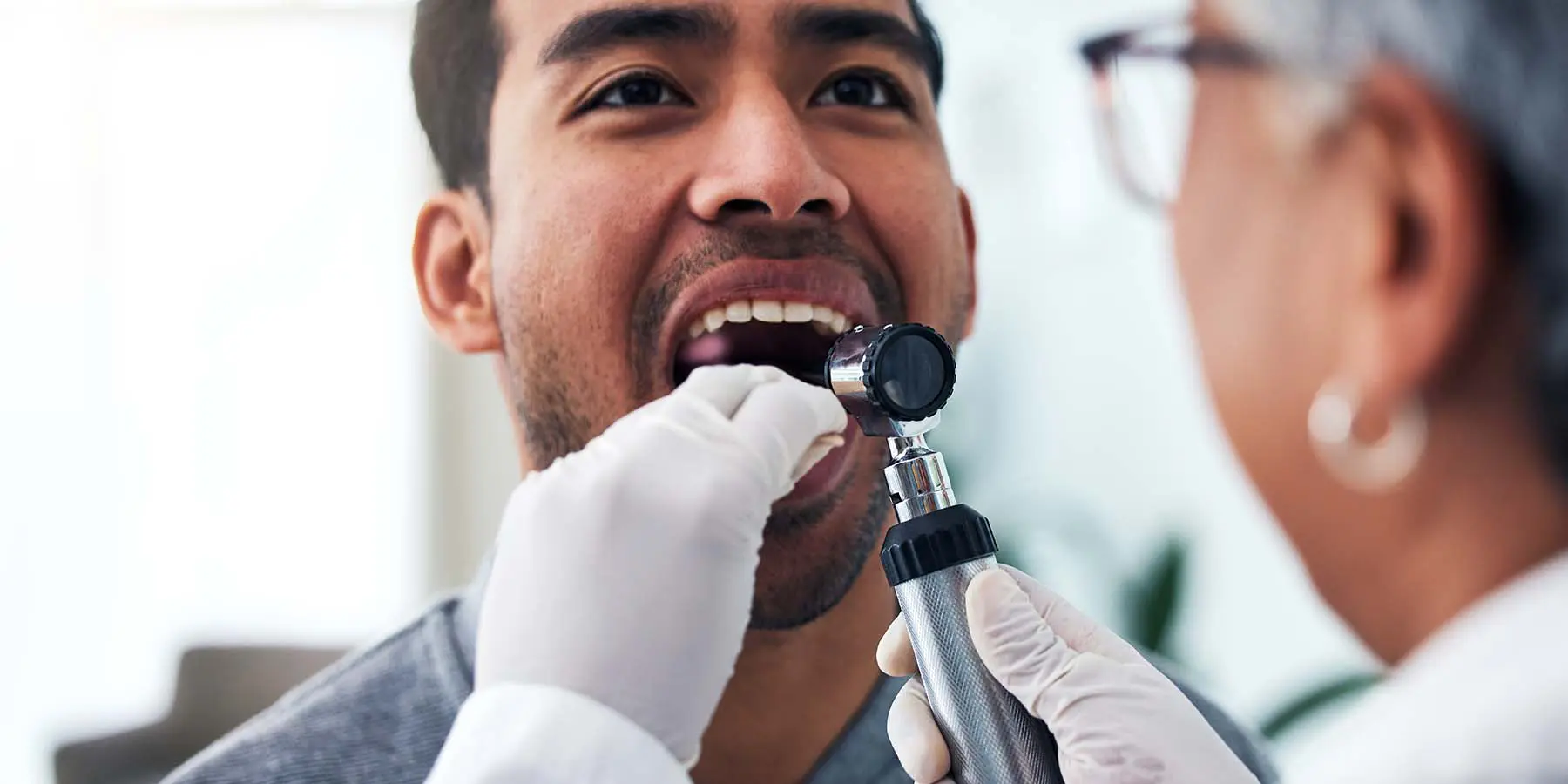Reviewed By Dr. Jeffery Kesecker, DDS
Reading Time: 5 minutes
April is Oral Cancer Awareness Month, a national effort to raise awareness about the importance of early detection and routine screenings.
In this blog, you will learn what oral cancer is, who is at greatest risk, what happens during a screening, and how you can take steps to protect your health.
Table of Contents
Key Takeaway
Oral Cancer Awareness Month is an important reminder that routine screenings save lives. Early detection through exams with your dentist or an oral surgeon increases survival rates, prevents late-stage complications, and supports long-term health.
What Is Oral Cancer?
Oral cancer includes cancers that begin in the oral cavity or oropharynx (the back of the throat). It can affect the:
- Lips
- Tongue
- Gums
- Inner cheeks
Roof and floor of the mouth - Throat or tonsils
The most common type is squamous cell carcinoma, which starts in the flat cells lining the mouth and throat.
Why Oral Cancer Awareness Month Matters
Oral cancer kills one person every hour in the U.S.
Most cases are not diagnosed until the later stages, when treatment is more complicated and survival rates are lower.
Oral Cancer Awareness Month is about:
- Promoting routine dental screenings
- Educating the public about signs and symptoms
- Encouraging healthier lifestyle habits
- Supporting individuals and families affected by oral cancers
Who Is at Risk for Oral Cancer?
Anyone can develop oral cancer, but certain factors increase the risk:
- Tobacco use (including cigarettes, cigars, and smokeless tobacco)
- Heavy alcohol consumption
- HPV infection, especially HPV-16
- Prolonged sun exposure (linked to lip cancer)
- Age over 45
- Weakened immune system
- Men and people assigned male at birth
Knowing your risk is an important step in early detection.
Why Regular Oral Cancer Screenings Matter
Most individuals first receive an oral cancer screening during their routine dental exam with their family dentist. These screenings are quick, painless, and often part of a standard checkup.
Dentists are trained to spot signs of abnormal tissue, sores, or other warning signs that may require further evaluation.
If a dentist identifies something suspicious, they may refer the patient to an oral surgeon for a more detailed examination or biopsy.
What Happens During a Specialist Evaluation
When referred to Dr. Kesecker, patients receive a thorough evaluation that may include:
- A review of medical history and risk factors
- A comprehensive exam of the lips, tongue, cheeks, jaw, and throat
- A discussion of possible next steps, including biopsy if necessary
Although oral biopsies are not always covered by dental insurance, our team will guide each patient through the referral and diagnostic process with compassion and clarity.
How to Support Oral Cancer Awareness Month
You can help raise awareness and protect your community by:
- Scheduling your annual dental exam
- Encouraging friends and family to see their dentist
- Sharing facts and resources on social media
- Quitting tobacco and reducing alcohol consumption
- Protecting your lips from sun damage using SPF lip balm
- Staying current with your HPV vaccination
Need a Specialist Referral? We Are Here to Help
If your dentist has referred you for a biopsy or further evaluation of an oral lesion, Dr. Kesecker, DDS, provides expert care and guidance throughout the process.
To book an appointment at our Harrisonburg location, call (50) 437-1230 or visit us at 2071 Pro Pointe Lane, Harrisonburg, VA.
To book an appointment at our Staunton location, call (540) 213-8750 or visit us at 110 Mactanly Pl C, Staunton, VA.
FAQs About Oral Cancer
What are the 5 S’s of oral cancer?
The 5 S’s stand for Sore, Surface, Swelling, Speech, and Swallowing. These represent common symptoms to watch for.
How often should I get an oral cancer screening?
At least once a year, or more often if you have known risk factors or a history of cancer.
What is the life expectancy after mouth cancer?
Life expectancy varies based on the stage at diagnosis. If caught early, the five-year survival rate is about 84%. For later-stage cases, the survival rate drops. Regular screenings significantly improve outcomes.
What month is Oral Cancer Awareness Month?
Oral Cancer Awareness Month is observed in April every year. It focuses on educating the public and encouraging regular screenings.

